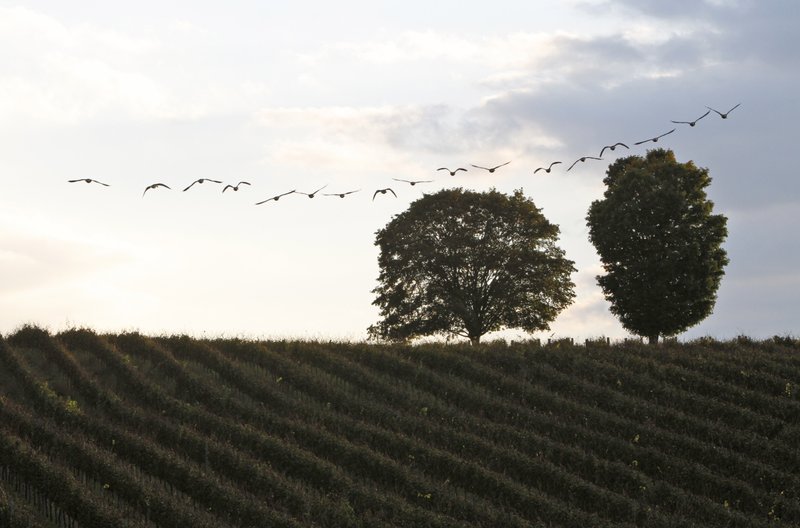President Donald Trump’s Virginia vineyard could be eligible for a federal bailout under the $2.2 trillion coronavirus stimulus he signed into law last month, despite provisions in the bill that Democrats said were intended to prevent him and his family from personally benefiting.
Deep in the fine print of the law passed by Congress to try to arrest an economic free fall is language that would the make the vineyard eligible for aid extended to growers and producers of “specialty crops,” among them grapes used to make wine.
There is no indication that any of Trump’s companies, which are currently being operated by his sons, will apply for the aid, and a company representative said Friday there were no plans to do so.
The White House declined to comment, but last month, Trump refused to rule the possibility out.
“Let’s just see what happens, because we have to save some of these great companies,” he said on March 22, when asked specifically during a news conference if his companies would forgo such aid.
Trump’s private business interests have been the subject of scrutiny from the moment he decided that, unlike other presidents, he would not divest his holdings or put them in a trust when he assumed the presidency. Most recently, he proposed holding the G-7 summit — which has since been canceled because of the outbreak — at his Doral resort in Florida, only to abandon the effort after intense criticism.
Federal employees, officeholders and officials are prohibited by laws and regulations intended to stop them from personally benefiting from their positions. Many of those restrictions, however, don’t apply to the president, including provisions aimed at limiting conflicts of interest.
After Trump refused to say whether his companies would seek aid, Democrats negotiated to add restrictions to the stimulus bill before it passed Congress preventing the president and his family from personally benefiting.
But those guardrails only apply to one massive $500 billion tranche of money set aside in the law.
The limitations don’t apply to a separate $9.5 billion fund made available for producers of “specialty crops,” which under U.S. Department of Agriculture guidelines includes grapes.
“It certainly looks like there are ways that the Trump Winery could benefit,” said Jordan Libowitz, a spokesman for the government watchdog group Citizens for Ethics and Responsibility in Washington. “Grape growers we think definitely could qualify.”
The hospitality industry has been hit hard by the coronavirus pandemic, including the golf courses, hotels and resorts that are staples of the Trump Organization.
The Trump Winery, which is located outside Charlottesville, has limited the hours of its tasting room and restricted its offerings to pickup and delivery of food and wine. A hotel on the grounds has been closed through May 19, according to a notice posted on the winery’s website.
Control of Trump Winery isn’t entirely clear. The president has repeatedly said he owns it. And his 2019 financial disclosure shows he collected revenue from the winery hotel and rent from the vineyard. The disclosure also states that Trump-controlled companies own Trump Vineyard Estates LLC.
Yet a statement on the winery’s website says that Trump Winery is a registered trade name of a company controlled by Trump’s son Eric, “which is not owned, managed, or affiliated with Donald J. Trump or any of his affiliates.”
Trump isn’t the only one in Washington with a stake in wine grapes. House Speaker Nancy Pelosi’s family has a vineyard in California. But members of Congress are barred under federal laws and congressional ethics rules from directly participating in federal government contracts.
A Pelosi spokesman said the speaker’s family would not seek the funds even if they were eligible for the aid.
The Trump Winery isn’t the only business that could get a cut of stimulus money. Trump Organization hotels could be eligible for small business loans to keep employees on the payroll. And tax changes made under the law could also benefit him and others real estate developers.
In a letter to the White House sent Thursday, Sen. Sheldon Whitehouse, D-R.I., and Rep. Lloyd Doggett, D-Texas, requested records detailing any internal deliberations related to some of the tax provisions.
Before Trump was president he showed a willingness to pursue such types of relief.
His two New Jersey golf courses previously received an agriculture tax credit by growing hay and using grass-eating goats to help maintain the grounds, the Wall Street Journal reported in 2016. In 2005, he received a $17 million insurance payment for hurricane damage at his private Mar-A-Lago club, though an Associated Press investigation in 2016 found little evidence of large-scale damage.
(AP)











